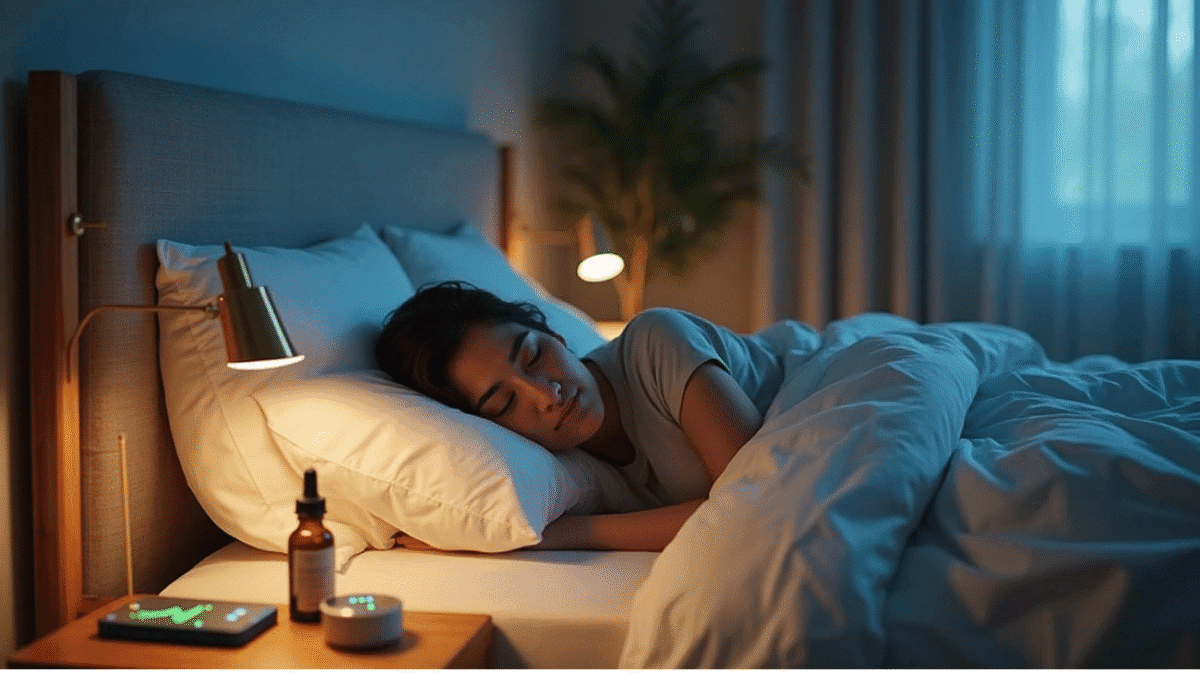A beginners guide to CBD, Health and Wellness
CBD for Sleep: What Brain Science Reveals About Better Rest
Table of Contents
Sleep difficulties affect a significant portion of the population, with many people struggling to achieve the recommended hours of rest each night. This widespread issue has led to growing interest in CBD for sleep as a potential solution. Cannabidiol (CBD) is a non-psychoactive compound extracted from the cannabis plant, which supporters believe may help with various sleep disturbances, anxiety, and pain.
CBD is different from tetrahydrocannabinol (THC) – the compound responsible for the ‘high’ associated with marijuana. Unlike THC, CBD does not produce intoxicating effects, which is why some consider it for sleep-related concerns.
Recent research suggests a complex relationship between CBD and sleep patterns. Studies indicate that CBD may extend non-REM sleep periods, which could potentially benefit those experiencing sleep difficulties. However, this alteration in sleep structure may come with considerations. While a 2019 study found that more participants experienced improved sleep than disrupted sleep when using CBD, other research suggests that CBD might affect certain aspects of memory performance.
The endocannabinoid system (ECS) appears central to these effects. This system helps regulate sleep-wake cycles throughout the body, and CBD may influence these patterns through its interaction with ECS receptors. Although early findings show promise for some sleep concerns, questions remain about appropriate dosing and timing, particularly regarding how CBD taken before bedtime might affect different aspects of rest and cognitive function.
Discover our full range of health benefits guides, as well as information on sleep and wellness supplements.
How CBD interacts with the brain’s sleep systems
The endocannabinoid system serves as a key regulatory network throughout the body, helping to control numerous processes including sleep-wake cycles. Understanding how CBD works within this system provides insight into why it may influence sleep patterns.
CB1 and CB2 receptor roles in sleep regulation
The endocannabinoid system contains two main receptor types, each affecting sleep in different ways. CB1 receptors are found primarily in the central nervous system and play a direct role in sleep stability and duration. These receptors concentrate in brain areas crucial for sleep regulation, including the hypothalamus, brainstem, and thalamus.
CB2 receptors, whilst mainly linked to immune function, also contribute to sleep regulation by modulating inflammatory pathways. CBD interacts with these receptors differently than THC does. Rather than binding directly to the receptors, CBD inhibits an enzyme called fatty acid amide hydrolase (FAAH), which breaks down anandamide—a naturally occurring cannabinoid in the body. This process increases anandamide levels, potentially enhancing its sleep-promoting effects.
Endocannabinoid modulation of the sleep-wake cycle
The endocannabinoid system helps maintain balance in sleep-wake cycles through complex signalling pathways. Natural cannabinoids in the body follow a circadian rhythm, with levels changing throughout the day and night. CBD may help stabilise these fluctuations, potentially addressing imbalances that contribute to sleep difficulties.
CBD also influences adenosine signalling—a neurotransmitter that builds up during wakefulness and promotes sleepiness. By affecting adenosine reuptake, CBD may enhance its sleep-inducing effects, particularly when taken as CBD before bed.
CBD vs THC: mechanisms of action on sleep
Although both compounds come from the cannabis plant, CBD and THC affect sleep through markedly different mechanisms. THC acts directly at CB1 receptors, initially reducing the time it takes to fall asleep but often disrupting REM sleep. This disruption typically leads to reduced dream recall and potentially impaired sleep quality over time.
CBD works through multiple indirect pathways. Beyond its effects on FAAH and adenosine, CBD activates serotonin receptors (specifically 5-HT1A), which may help regulate sleep-wake cycles and reduce anxiety that interferes with sleep onset. CBD also demonstrates biphasic effects—low doses may be mildly stimulating whilst higher doses tend to be sedating. This explains why determining the right dosage requires careful consideration.
How CBD affects sleep phases and cycles
Sleep occurs in distinct phases that cycle throughout the night. Research examining CBD’s impact on these cycles shows varied effects depending on dosage, timing, and individual factors.
REM sleep and CBD use
REM (rapid eye movement) sleep, characterised by increased brain activity and dreaming, appears particularly sensitive to cannabinoid influence. Laboratory studies suggest that CBD at moderate to high doses may decrease REM sleep duration in some individuals. This reduction could explain why some CBD users report fewer or less vivid dreams.
However, CBD’s interaction with REM sleep differs significantly from THC, which consistently suppresses REM sleep. CBD’s effects appear more regulatory, with some studies suggesting it might help normalise REM patterns in people with disrupted sleep architecture.
Deep sleep enhancement
Evidence suggests that whilst CBD might modestly reduce REM sleep, it simultaneously extends deep non-REM sleep phases. These stages, particularly N3 slow-wave sleep, are essential for physical restoration, immune function, and memory consolidation.
For those taking CBD before bed, this shift towards increased deep sleep may provide considerable benefits. This is especially relevant for people with conditions characterised by insufficient restorative sleep. The enhancement of slow-wave sleep might partly explain why many users report feeling more refreshed after using CBD for sleep.
Dosage effects: a double-edged response
CBD demonstrates what researchers call a biphasic dose-response relationship with sleep. This means the effects differ markedly depending on the amount taken:
Lower doses (approximately 10-20mg) may actually promote alertness rather than sleepiness. This occurs due to CBD’s interaction with serotonin receptors and explains why some people using small amounts might experience delayed sleep onset.
Higher doses (typically 40-160mg) tend to produce sedative effects. This creates challenges when determining the right amount for sleep support, as the threshold between stimulating and sedating effects varies considerably between individuals.
Body weight, metabolism, and concurrent medications all influence where this threshold lies for each person. Timing also matters significantly – CBD taken several hours before sleep might initially increase alertness before later improving sleep quality, whereas taking it immediately before bed could potentially delay sleep onset for some users.
What is CBD used for in sleep disorders?
Research into CBD for sleep continues to develop, with studies examining its potential benefits for various sleep-related conditions. However, the evidence varies considerably depending on the specific disorder being investigated.
CBD is often considered for the following sleep conditions:
1. Insomnia
Clinical studies examining CBD for insomnia show mixed but encouraging results. A 2023 systematic review found that all 34 examined studies reported improvement in insomnia symptoms for at least some participants. Among studies using CBD-predominant therapy, 4 of 7 studies demonstrated significant improvements in sleep outcomes.
It’s worth noting, however, that only 2 of these 34 studies specifically focused on patients with diagnosed insomnia. Another trial exploring the maximum legal dose in Australia (150 mg) found that whilst CBD was similar to placebo for most sleep outcomes, participants receiving CBD showed significantly greater sleep efficiency after both one and two weeks of treatment. This suggests CBD’s effects on insomnia may involve mechanisms beyond simple sedation.
2. PTSD-related sleep disturbances
People with post-traumatic stress disorder often experience significant sleep problems, particularly nightmares. A review found that cannabinoids may help reduce PTSD symptoms, specifically targeting sleep disturbances and nightmares. Research indicates that individuals with more severe PTSD are increasingly likely to use cannabis specifically to improve sleep.
One animal study examining CBD administration in a rat model of PTSD showed sleep improvements. However, most human studies remain small with significant limitations, making definitive recommendations premature.
3. Restless leg syndrome
Despite anecdotal reports suggesting CBD may provide relief for Restless Leg Syndrome (RLS), robust scientific evidence remains limited. A double-blind, placebo-controlled trial examining CBD (75-300 mg) in patients with RLS associated with Parkinson’s disease found no significant difference compared to placebo.
Nevertheless, spontaneous patient reports have documented “remarkable and total remission” of RLS symptoms following cannabis use. This discrepancy highlights the need for further controlled investigations specifically targeting primary RLS.
4. Obstructive sleep apnoea
Early research into cannabinoids for Obstructive Sleep Apnoea (OSA) shows modest potential, though most studies have examined synthetic cannabinoids rather than CBD specifically. A systematic review identified nine studies, primarily examining the synthetic cannabinoid dronabinol. Eight of these nine studies reported statistically significant improvements in OSA outcomes, including reductions in the apnoea-hypopnoea index.
However, side effects remain concerning, with 70-80% of participants reporting neuropsychiatric and gastrointestinal adverse events. Currently, the American Academy of Sleep Medicine does not recommend cannabinoids for OSA treatment, citing insufficient long-term safety and efficacy data.
If you’re experiencing sleep difficulties or considering CBD for sleep disorders, you should speak to your GP or other healthcare professional to ensure that it is safe and appropriate for you to do so.
How to use CBD for sleep: timing, dosage and products
For those considering CBD for sleep, understanding the practical aspects of use can help optimise potential benefits. Timing, dosage, and product selection all play important roles in how CBD might affect your sleep.
When should you take CBD before bed?
Most guidance suggests taking CBD 30-60 minutes before bedtime. This timing allows the compound to enter the bloodstream and interact with the endocannabinoid system before you attempt to sleep.
Sublingual oils typically take effect within 15-45 minutes, making them suitable for those seeking quicker onset. Edibles such as gummies require longer to be absorbed—up to two hours—due to the digestive process. Consistency in timing appears important, with many clinical studies recommending evening dosing specifically for sleep-related concerns.
What dosage of CBD is recommended for sleep?
Research indicates considerable variation in effective CBD dosage for sleep. Clinical studies often begin with 25mg per day in capsule form for sleep-related complaints. Higher doses (300-600mg) may demonstrate stronger sedative effects, whilst lower doses might actually promote wakefulness. A 2023 trial exploring 150mg CBD found improvements in sleep efficiency after two weeks of treatment.
Starting with a low dose and gradually increasing based on individual response represents the most sensible approach. Long-term safety data shows doses up to 1500mg per day have been well-tolerated.
Types of CBD products for sleep
CBD products come in different formats, each with varying absorption rates and onset times:
Sublingual oils and tinctures: Fastest-acting oral method with effects typically within 15-45 minutes
Edibles and gummies: Slower onset (45-120 minutes) but potentially longer-lasting effects
Capsules: Consistent dosing with moderate absorption time
Vapes: Most rapid effects but shorter duration and potential respiratory considerations
Sleep-specific formulations often combine CBD with complementary ingredients such as melatonin, valerian root, and chamomile.
Understanding product quality: certificates of analysis
A Certificate of Analysis (COA) provides important verification of CBD product quality and safety. Legitimate COAs come from accredited third-party laboratories—not the manufacturer.
When examining a COA, focus on cannabinoid content (ensuring CBD matches label claims), THC levels (legally ≤0.3% by weight), and contaminant testing. For sleep products specifically, verify CBD concentration matches advertised potency, as one analysis found 26% of products contained less CBD than claimed, whilst 43% contained substantially more. Reputable manufacturers provide batch-specific COAs accessible via their website or QR codes on packaging.
If you’re considering using CBD for sleep, you should speak to your GP or other healthcare professional to ensure that it is safe and appropriate for you to do so.
CBD for sleep: what you should know

CBD shows potential as a sleep aid for those experiencing difficulties with rest. Research indicates that CBD works through the endocannabinoid system, affecting sleep patterns differently from THC. While CBD may reduce REM sleep duration in some people, evidence suggests it can enhance the deep non-REM sleep phases that are important for physical recovery and memory processing.
The dose-dependent effects of CBD create both opportunities and challenges for sleep improvement. Lower amounts may promote alertness, while higher doses generally produce more sedating effects. This explains why determining the right amount requires careful consideration and often individual experimentation.
Early clinical evidence suggests CBD may benefit various sleep-related conditions. People with insomnia, PTSD-related sleep disturbances, restless leg syndrome, and sleep apnoea have reported improvements, though the scientific validation varies between conditions. However, researchers emphasise that larger, more controlled studies are needed before making definitive recommendations.
Practical factors significantly influence effectiveness when using CBD for sleep. The timing of consumption (usually 30-60 minutes before bedtime), delivery method (such as oils, gummies, or capsules), and product quality verification all play important roles in both safety and potential benefits.
If you’re considering using CBD for sleep, you should speak to your GP or other healthcare professional to ensure that it is safe and appropriate for you to do so. This is particularly important if you are experiencing ongoing sleep difficulties, have any existing health conditions, or are taking any medications.
More research will continue to improve our understanding of how CBD affects sleep. Currently, CBD appears to be one option among many for addressing sleep concerns, rather than a complete solution on its own. Those considering CBD should start with low doses, maintain realistic expectations, and view it as part of a broader approach to sleep health.
All health content is provided for general information only, and should not be treated as a substitute for the medical advice of your own doctor or any other health care professional.
FAQs
Q1. How does CBD affect sleep patterns? CBD can influence sleep architecture by potentially extending non-REM sleep periods and modestly reducing REM sleep duration. It interacts with the endocannabinoid system, which plays a role in regulating sleep-wake cycles. The effects can vary based on dosage, with lower doses sometimes promoting alertness and higher doses typically inducing sedation.
Q2. Is CBD effective for treating insomnia? Recent studies suggest CBD may help improve insomnia symptoms for some individuals. A systematic review found that most studies reported improvements in sleep outcomes when using CBD-predominant therapy. However, more research is needed to establish definitive clinical recommendations for insomnia treatment.
Q3. What is the recommended CBD dosage for sleep? The optimal CBD dosage for sleep varies among individuals. Clinical studies often start with 25 mg per day, but some research has explored doses up to 150-600 mg. It’s generally advisable to start with a low dose and gradually increase based on individual response. Consulting a healthcare provider is recommended for personalised guidance.
Q4. How long before bedtime should CBD be taken? For optimal effects, CBD is typically consumed 30-60 minutes before bedtime. This timing allows the compound to enter the bloodstream and interact with the endocannabinoid system before sleep onset. The absorption time can vary depending on the delivery method, with sublingual oils acting faster than edibles or capsules.
Q5. Can CBD help with sleep-related disorders other than insomnia? Early research suggests CBD may have potential benefits for various sleep-related disorders. Studies have shown promising results for PTSD-related nightmares, and there are ongoing investigations into its effects on restless leg syndrome and obstructive sleep apnoea. However, more robust clinical trials are needed to confirm these potential benefits.


